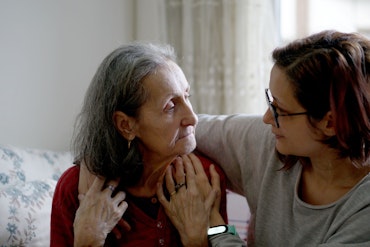Aged Care Royal Commission release more research and background papers
This October, the Royal Commission into Aged Care Quality and Safety has released research papers that observed national aged care benchmarks not comparing well globally and found that successive Australian Governments are unwilling to commit to change.
![<p>The first research paper studied nursing home staffing levels and how they compared to international benchmarks, and the eighth background paper analysed government action. [Source: Shutterstock]</p>](https://agedcareguide-assets.imgix.net/news/articles/news/articles/shutterstock_141093532.jpg?fm=pjpg&format=auto&w=550&q=65)
The first research paper studied nursing home staffing levels and how they compared to international benchmarks, and the eighth background paper analysed government action. [Source: Shutterstock]
The first research paper, released on 11 October, studied nursing home staffing levels and how they compared to international benchmarks.
Research undertaken by the Australian Health Services Research Institute at the University of Wollongong found that over half of all Australians in aged care homes had staffing levels that would be given a one or two-star rating in America’s five-star rating system.
The Royal Commission has currently been investigating staffing levels and the staff skill mix in residential aged care since it has been highlighted as a significant issue in the industry.
The aim of this report provided to the Commission was to analyse the current staffing levels of aged care homes compared to standards in other countries.
It was concluded in the report that the United States has the best system available to measure good staffing levels due to its five-star scale method.
Three stars is considered an industry average, with any rating under three stars considered below average.
Star ratings consider the amount of nurse and personal carer time per resident, adjusted depending on the residents’ care needs, so that homes can be compared against each other.
When the US benchmark for staffing was applied against Australian data, the University found that 57.6 percent of all Australian aged care residents are in homes that would be rated as a one or two star nursing homes.
Authors of the report, Kathy Eagar, Anita Westera, Milena Snoek, Conrad Kobel, Carol Loggie, and Rob Gordon, believe that one or two star nursing homes are not providing an acceptable level of staffing for their residents.
The study also found that 27 percent of Australian aged care residents are in three star homes, 14.1 percent are in four star nursing homes, and only 1.3 percent are in aged care homes considered as five star.
For all Australian aged care homes to have at least a three star rating, there would need to be an average increase of 37.3 percent in care staffing in the homes currently with a one or two star rating, or a 20 percent total increase in residential aged care staff across Australia.
The eighth background paper, A History of Aged Care Reviews, released by the Commission on 28 October, follows seven other background reports released over the last year.
In the report, the paper found that successive Australian Governments over the last two decades have not been willing to make change in the aged care industry, even after a huge number of reviews and inquiries to fix the industry.
Analysing 18 major public reports and inquiries around Government funded aged care in Australia since 1997, the Commission found that the Government has barely implemented any action in response to report recommendations.
The paper says, “Responses often come years after the review and recount what has been done in an almost tangential way.
“Changes committed to are often slow to eventuate, or fall away prior to implementation.”
These sentiments have been repeated constantly to the Commissioners since the beginning of the Commission back in April.
The last two decades of reviews have addressed many aspects of the aged care industry, including funding, workforce, the regulatory system, young people in nursing homes, palliative care, dementia care, and quality and safety.
The paper concludes, “While governments have responded with ad hoc reforms to elements of the system, they have not been able to resolve the underlying problems with a system that has failed to provide the Australian community with the assurance of quality and safety in aged care that it expects.”
Both of these reports, available on the Commission website, were prepared for the information of the Royal Commission and the public. The views expressed in it are not necessarily the views of the Commissioners.























